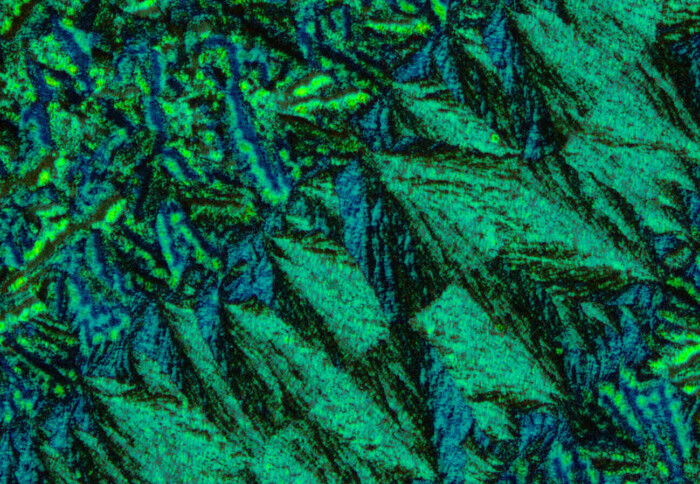New centre to develop sustainable materials for a green future

Microscopic image of carbon based polymers. Dr Jess Wade
New $150 million research centre at Imperial College London will develop sustainable routes to materials for a green future.
The Rio Tinto Centre for Future Materials at Imperial College London will transform current mineral extraction approaches to support the global transition from fossil fuels to renewable energy.
The new centre will be led by Imperial College London in partnership with Rio Tinto, and will act as the hub for collaboration with other leading global institutions.
It will drive a new, sustainable model for materials production, supporting the mining and materials processing industry in developing new sustainable techniques and technologies to provide the critical materials the world needs for the energy transition.
A renewable future
The global transition to renewable energy generation, use and storage will require a significant growth in the production and supply of critical materials including metals and rare earth elements. These will be needed to support the scale up of electrification such as wind turbines, electric vehicles, and green hydrogen production. The mining industry plays a vital role in increasing the supply of these materials.
Global governments have recognised these materials as key to enable a rapid, just and sustainable transition to a decarbonised society. However, the extraction of the earth’s resources is itself energy and water intensive and can be ecologically damaging. A sustainable future requires dramatic and rapid change in this industry.
The Rio Tinto Centre for Future Materials will deliver research programs to transform the way vital materials are produced, used and recycled and make them more environmentally, economically and socially sustainable.
All aspects of human society rely on materials – from housing to transport, energy, communications and health. We need to create sustainable ways to extract, process, and reuse these resources. Professor Mary Ryan Vice Provost (Research and Enterprise)
Rio Tinto has committed $150 million over ten years to create the centre, which will be embedded in the rich innovation ecosystem of Imperial College London’s White City Campus. The Centre’s work will follow a systems-based approach, as developed by Imperial’s Transition to Zero Pollution initiative - considering not just a single problem, but the big picture.
The Cross-Faculty Centre will be led from the Department of Earth Science and Engineering and the Inaugural Director will be Professor Jan Cilliers, Chair in Mineral Processing. It will bring together diverse, inter-disciplinary teams to deliver innovative, and transformative solutions with environment, society, and governance at their core.
Rio Tinto Chief Executive Jakob Stausholm said “For the world to reach net zero, we must find better ways to provide the materials it needs. No single player can do this alone, and research and development plays a vital role. Imperial College London is one of the world’s leading institutions focused on science and engineering – I cannot wait to see the progress we make, as we bring together the best of industry and academia, with shared ambition.”
Professor Mary Ryan, Vice Provost (Research and Enterprise) at Imperial, said: “All aspects of human society rely on materials – from housing to transport, energy, communications and health. We need to create sustainable ways to extract, process, and reuse these resources.
“Moving to a truly sustainable society requires a holistic approach to these complex industrial processes. This is inherent to Imperial’s approach. We will tackle these challenges and design future innovations that are resource and energy efficient, nature positive, humancentric and just. By working hand-in-hand with other leading international institutions, we will create a truly multidisciplinary, global effort to drive the next industrial revolution in harmony with nature and people.”
Climate at Imperial
Key partners will be announced in the coming months with a plan to launch collaborative centre programmes in early 2024.
Imperial College London is a world-leader in climate change research, and uniquely placed to deliver the scientific, technological and policy solutions needed to make a zero-pollution future a reality.
Imperial’s flagship Transition to Zero Pollution (TZP) initiative goes beyond thinking about zero carbon to consider human-made pollution in all its forms – from chemical spills and ocean plastic to toxic air and heavy metals accumulating in our environment. It focuses on the intersecting triple planetary crises: climate change, biodiversity loss and chemical pollution.
TZP-research transcends traditional fields, bringing together researchers across Imperial and forging new approaches that converge disciplines, from fundamental science and engineering, systems thinking, human health, new business models, and policymaking to create holistic solutions to pollution in all its forms.
Imperial has pledged to use its convening power to build and facilitate partnerships across the world that drive the transition to net-zero pollution, working with industry, business, governments, our local communities and the wider public.
Article text (excluding photos or graphics) © Imperial College London.
Photos and graphics subject to third party copyright used with permission or © Imperial College London.
Reporter
Emily Head
Communications Division
Deborah Evanson
Communications Division